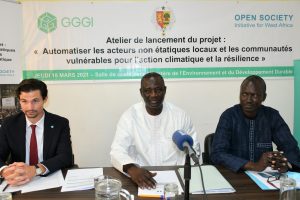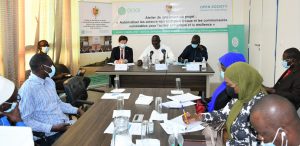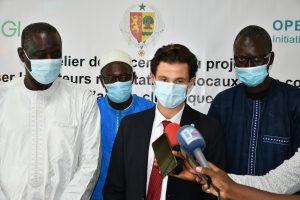In partnership with Open Society Initiative for West Africa- OSIWA, GGGI launched the climate action and resilience project’s for the civil society and vulnerable communities in Senegal and Ivory Coast. The ceremony was held on March 18, 2021, chaired by the Ministry of Environment and Sustainable Development and the financing partner OSIWA, civil society representatives: Non-Governmental organizations, associations, universities and firms.
“This project aims to expand civil society and organizations – CSO empowerment on the ambitious climate action advocacy at national ad international level. It will also allow us to emphasize Senegal CSO mapping of actors and identify capacity building needs on climate change issues,” opened Romain BRILLIE, during allocutions session. The Deputy National Environment and Classified Establishment Director from the Environment and Sustainable Ministry goes on to say that, in Senegal, implementing environmental policies require cross functional actors from civil society which are key contributors on designing, implementing and monitoring of environmental strategies specially on the climate change. Under the Paris Agreement, Senegal has defined the National Determined Contribution- NDC validated by ministerial council in the line with the Senegal rising plan. As we are at 2nd stage of the NDC implementation, civil actors are invited to contribute to different kinds of activities listed in the roadmap. Capacity building will be crucial for civil society’s ownership upon policies and climate change execution phasing.
ENDA Energies Executive Director reinforces Senegal’s position on implementing measures following NDC validation. “To move towards climate mitigation and adaptation solutions, Senegal states has to collaborate with non states actors as key actions that generate change will come from the field. Transformation linked to energy system to be move into mix energy, smart agriculture to be promote, urban transformation in terms mobility and industrial issues. All these thematics push us to work closer with the government on the new development pathways. As we are expecting to participate in climate negotiations, developing capacity building is essential and interesting for non-state actors enrolled on that program.”
The first stage of capacity building should offer key knowledge elements for CSO in Senegal and Ivory Coast related to climate change with some dedicated thematics in which they will be involved. Another side will be to support these CSOs on elaborating actions and advocate notes with national interests and formulate common positions that the Ministry of Environment and Sustainable Development will carry out at an international level ahead of COP26 negotiations.
The Republic of Senegal is on the path to making the green growth transition and is seeking to improve the CSO role as relay between the government and population. The project will raise Senegal’s voices on policy advocacy and will ensure commitment from civil society as a guarantee to secure the United Nations Convention Mechanisms on Climate Change ( articles 4,6,7 ) and the Rio Declaration.


